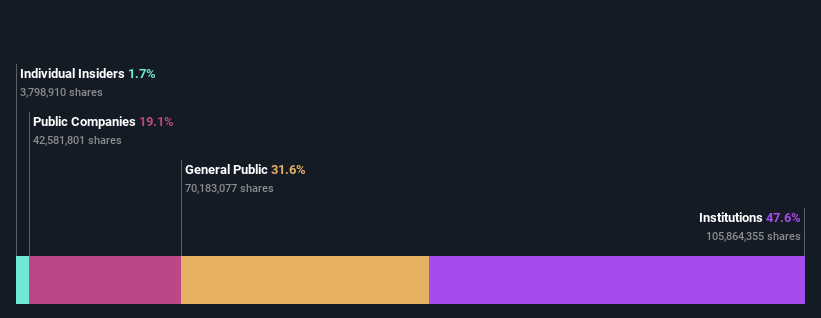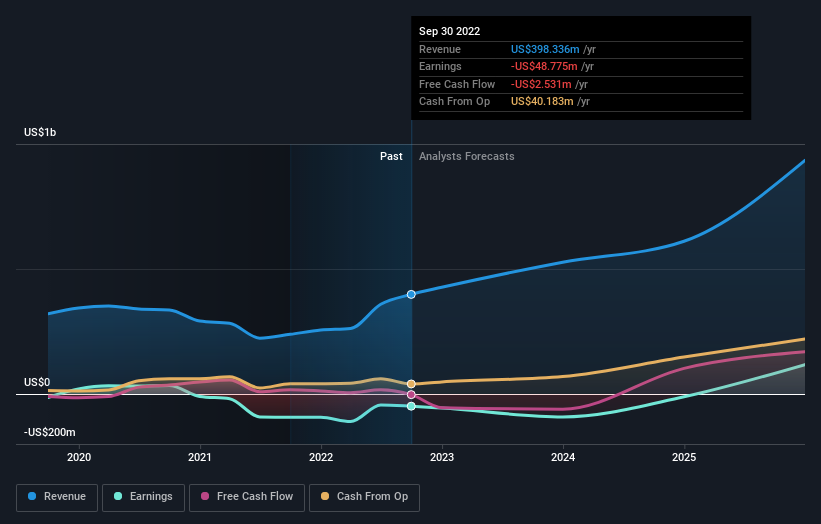- United States
- /
- Oil and Gas
- /
- NasdaqGS:CLNE
Recent uptick might appease Clean Energy Fuels Corp. (NASDAQ:CLNE) institutional owners after losing 15% over the past year

A look at the shareholders of Clean Energy Fuels Corp. (NASDAQ:CLNE) can tell us which group is most powerful. With 48% stake, institutions possess the maximum shares in the company. In other words, the group stands to gain the most (or lose the most) from their investment into the company.
Institutional investors would appreciate the 5.7% increase in share prices last week, given their one-year returns have been disappointing at 15%.
Let's take a closer look to see what the different types of shareholders can tell us about Clean Energy Fuels.
Check out our latest analysis for Clean Energy Fuels

What Does The Institutional Ownership Tell Us About Clean Energy Fuels?
Institutional investors commonly compare their own returns to the returns of a commonly followed index. So they generally do consider buying larger companies that are included in the relevant benchmark index.
We can see that Clean Energy Fuels does have institutional investors; and they hold a good portion of the company's stock. This suggests some credibility amongst professional investors. But we can't rely on that fact alone since institutions make bad investments sometimes, just like everyone does. If multiple institutions change their view on a stock at the same time, you could see the share price drop fast. It's therefore worth looking at Clean Energy Fuels' earnings history below. Of course, the future is what really matters.

We note that hedge funds don't have a meaningful investment in Clean Energy Fuels. TotalEnergies SE is currently the largest shareholder, with 19% of shares outstanding. The second and third largest shareholders are Grantham Mayo Van Otterloo & Co. LLC and BlackRock, Inc., with an equal amount of shares to their name at 5.7%. In addition, we found that Andrew Littlefair, the CEO has 0.6% of the shares allocated to their name.
A closer look at our ownership figures suggests that the top 11 shareholders have a combined ownership of 50% implying that no single shareholder has a majority.
Researching institutional ownership is a good way to gauge and filter a stock's expected performance. The same can be achieved by studying analyst sentiments. There are plenty of analysts covering the stock, so it might be worth seeing what they are forecasting, too.
Insider Ownership Of Clean Energy Fuels
While the precise definition of an insider can be subjective, almost everyone considers board members to be insiders. The company management answer to the board and the latter should represent the interests of shareholders. Notably, sometimes top-level managers are on the board themselves.
Insider ownership is positive when it signals leadership are thinking like the true owners of the company. However, high insider ownership can also give immense power to a small group within the company. This can be negative in some circumstances.
Our most recent data indicates that insiders own some shares in Clean Energy Fuels Corp.. The insiders have a meaningful stake worth US$20m. Most would see this as a real positive. Most would say this shows alignment of interests between shareholders and the board. Still, it might be worth checking if those insiders have been selling.
General Public Ownership
The general public, who are usually individual investors, hold a 32% stake in Clean Energy Fuels. While this size of ownership may not be enough to sway a policy decision in their favour, they can still make a collective impact on company policies.
Public Company Ownership
It appears to us that public companies own 19% of Clean Energy Fuels. It's hard to say for sure but this suggests they have entwined business interests. This might be a strategic stake, so it's worth watching this space for changes in ownership.
Next Steps:
While it is well worth considering the different groups that own a company, there are other factors that are even more important. Consider for instance, the ever-present spectre of investment risk. We've identified 1 warning sign with Clean Energy Fuels , and understanding them should be part of your investment process.
But ultimately it is the future, not the past, that will determine how well the owners of this business will do. Therefore we think it advisable to take a look at this free report showing whether analysts are predicting a brighter future.
NB: Figures in this article are calculated using data from the last twelve months, which refer to the 12-month period ending on the last date of the month the financial statement is dated. This may not be consistent with full year annual report figures.
New: AI Stock Screener & Alerts
Our new AI Stock Screener scans the market every day to uncover opportunities.
• Dividend Powerhouses (3%+ Yield)
• Undervalued Small Caps with Insider Buying
• High growth Tech and AI Companies
Or build your own from over 50 metrics.
Have feedback on this article? Concerned about the content? Get in touch with us directly. Alternatively, email editorial-team (at) simplywallst.com.
This article by Simply Wall St is general in nature. We provide commentary based on historical data and analyst forecasts only using an unbiased methodology and our articles are not intended to be financial advice. It does not constitute a recommendation to buy or sell any stock, and does not take account of your objectives, or your financial situation. We aim to bring you long-term focused analysis driven by fundamental data. Note that our analysis may not factor in the latest price-sensitive company announcements or qualitative material. Simply Wall St has no position in any stocks mentioned.
About NasdaqGS:CLNE
Clean Energy Fuels
Provides natural gas as alternative fuels for vehicle fleets and related fueling solutions in the United States and Canada.
Reasonable growth potential with adequate balance sheet.


